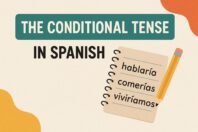Ya in Spanish: A tiny word with a range of meanings

Get our free email course, Shortcut to Conversational.
Have conversations faster, understand people when they speak fast, and other tested tips to learn faster.
More infoThe Spanish word ya is one you’ll hear all the time, so knowing the different meanings and uses of ya in Spanish will make a big difference in your comprehension. What’s more, its meaning can shift significantly depending on how it’s used, so understanding its nuances can make a big difference.
Whether you’re dipping your toes into Spanish or already navigating conversations like a pro, understanding ya is a must. In today’s post, we’ll cover all the facets of ya in Spanish so you can use it like a native speaker!
Ya meaning
At its most basic, ya is a translation of now or already in English. However, depending on the tone, context, or region, this basic meaning can be quite different. Let’s break down the most common uses of ya in Spanish and see how they’re each applied in everyday Spanish.
Ya as an adverb
In most of its uses, ya in Spanish functions as an adverb. In this sense, it’s used to add some element of timing to the action of a verb. Ya can be used to indicate completion, immediacy, or a change in state, among others. Let’s take a look!
Already, Yet
In this context, our Spanish ya expresses that something has already happened before the present moment. We use it to indicate completion. The best translation here is usually already, though it can often be interpreted as yet in English when asking questions about whether something has been done yet.
- Ella ya salió del trabajo. – She already left work.
- ¿Ya terminaste la tarea? – Did you finish the homework assignment yet?
- Nosotros ya vimos esa película. – We’ve already seen that movie.
Now
We can also use ya in Spanish to refer to the present moment, so the equivalent in English is now.
- ¡Hazlo ya! – Do it now!
- Ya estoy listo para salir. – I’m ready to leave now.
- ¡Ven ya! – Come right now.
Pretty soon, In a moment, Later
In some cases, ya indicates that something will happen pretty soon or in a moment. The key detail here is that, by using ya, we’re suggesting that the action will occur in the not-so-distant future. It is similar to using in a little while or even later in English, as long as it’ll happen in the near future.
- Espérame un momento, ya te ayudo. – Wait a moment, I’ll help you in a bit.
- Baja a cenar, hijo. / Ya voy, mamá. – Come down to dinner, son. / I’m coming, Mom.
- Ahora mismo no puedo contestar, ya te llamo. – I can’t answer right now, I’ll call you in a moment.
Anymore
When used in negative sentences, ya often expresses that something no longer happens or is no longer true. This meaning is similar to anymore or no longer in English.
- Ya no quiero comer más dulces, me duele el estómago. – I don’t want to eat sweets anymore, my stomach hurts.
- Él ya no trabaja aquí. – He doesn’t work here anymore.
- Ya no vamos al parque los domingos. – We no longer go to the park on Sundays.
Yeah, Got it
In casual conversations, ya is sometimes simply thrown in as a way of showing acknowledgment. In this way, the speaker indicates with ya that they’ve understood or agree with with what’s being said. Here, our Spanish ya is similar to saying yeah in English, or other quick acknowledgments like okay or got it.
- Ya entendí el ejercicio. – Yeah, I understood the exercise.
- No olvides llevar las llaves. / Ya. – Don’t forget to bring your keys. / Okay.
- La lonchera azul es la de tu hermano y la verde es la tuya. / Ya. Gracias, mami. – The blue lunch box is your brother’s and the green one is yours. / I got it. Thank you, Mommy.
To add emphasis
Sometimes, ya is used in Spanish simply to add emphasis to a statement, often to stress urgency, certainty, or even frustration. It can be used in both positive and negative contexts. This is a fun use of ya in Spanish, because often it doesn’t need an English translation beyond an extra exclamation point!
- ¡Ya quiero que vayamos a ese concierto! – I really want us to go to that concert!
- ¡Ya te dije que no! – I told you no!
- Ya sé lo que vas a decir y no, no puedes ir a esa fiesta. – I know what you’re going to say and no, you can’t go to that party.
Ya locutions
A locution is a grammatical term for a word combination that has a specific use or meaning, independent of its constituent words. Ya appears in a few specific locutions, so we’ll see the most common ones here.
Si ya
Si ya is used to set a condition, or to indicate that something is acceptable in a specific circumstance. It’s similar to as long as or provided that in English.
- No hay problema si ya todos están de acuerdo. – There’s no problem, as long as everyone already agrees.
- Puedes usar mi auto si ya lo llenaste de gasolina. – You can use my car as long as you’ve already filled it up with gas.
- Iré contigo a la fiesta, si ya no me pides que lleve esos pantalones. – I’ll go with you to the party, as long as you don’t ask me to wear those pants anymore.
Ya que
Ya que introduces a reason or justification, similar to saying since or because in English.
- Ya que estás de pie, pásame eso. – Since you’re up, pass me that.
- Ya que estamos todos, empecemos. – Since we’re all here, let’s get started.
- Ya que sabes, explícame. – Since you know, explain it to me.
Ya as a distributive conjunction
There’s one last use of ya in Spanish that we need to mention, although it’s not so common. Here we use it at least twice in the sentence to introduce multiple related contexts. Thus, as a distributive conjunction, we say ya… ya… similarly to whether… or… in English.
- Ya en casa, ya en la calle, siempre debes ser respetuoso. – Whether at home or on the street, you must always be respectful.
- Ya con prisa, ya con calma, las cosas siempre deben hacerse correctamente. – Whether in a hurry, or calmly, things must always be done correctly.
- Ya de día, ya de noche. – Whether by day or by night.
Conclusion: Ya in Spanish
That covers it! So what does ya mean in Spanish? Let’s do a quick wrap-up before we go.
Today we learned that ya is a multifunctional word that adds subtlety and nuance to Spanish conversations. Its common meanings can range from already and now to in a moment, anymore, or even a simple acknowledgment like okay.
Throwing a ya or two into your Spanish conversations will help you sound more fluent and natural, or even more emphatic if you just want to make a point. So go ahead, pay close attention to the context, and use this tiny word that packs a punch!



